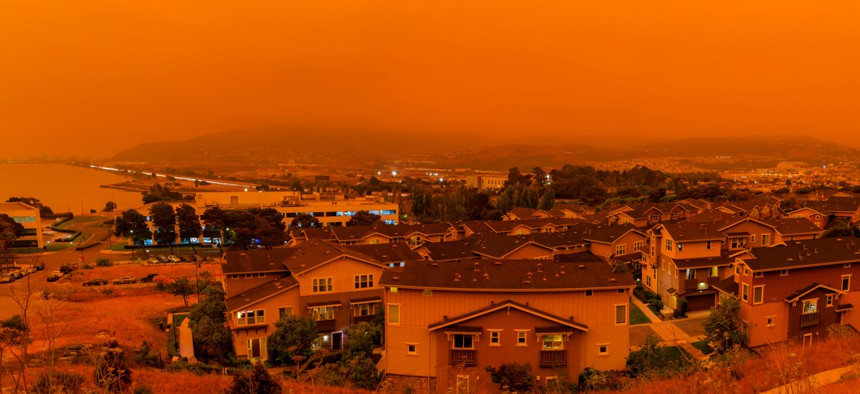The Insurance Industry Can Help States Act on Climate Change

Thick orange haze above San Francisco in early September from record wildfires in California. States should partner with the insurance industry to address climate change and the associated effects. SHUTTERSTOCK

Connecting state and local government leaders
COMMENTARY | States looking to act on climate change should consider partnering with the industry.
The wildfires devastating the West Coast states underscore that the effects of climate change are deadly and come with significant financial costs, which states must plan to address.
Between 2017 and 2019, the U.S. registered 44 natural disasters, each causing more than $1 billion in damage—more than double the annual rate of the previous 30 years. Looking ahead, the impacts only are expected to intensify. For example, populations that face substantial damages from hurricanes are likely to grow fivefold by 2075.
Similarly, over 14 million U.S. homes are currently at risk of flooding from river, urban and coastal waters and this risk grows to 16.2 million homes by 2050. By 2100, nearly 670 coastal communities could be chronically inundated by sea water. The U.S. National Climate Assessment estimated that about $1 trillion in coastal real estate is threatened by rising seas in combination with storms, floods and erosion. The fiscal exposure is staggering considering that FEMA’s National Flood Insurance Program already owes the U.S. Treasury $20.5 billion, despite more than $17 billion in debt cancelled from this program in 2017.
Additionally, climate volatility has and will continue to affect many of the social and environmental determinants of health like air and drinking water quality, food and shelter security and mental health. While the specific health effects will vary by region, vulnerable populations will be disproportionately harmed.
Many Americans are well aware of the potential destruction on the horizon. Almost half of the participants in a recent Climate Change in the American Mind survey said they would be personally harmed by the effects of a warming planet. These individuals will increasingly ask their government why more is not being done to reduce the immense risk of climate change. It won’t be sufficient for government leaders to take timid action or wait and see what happens.
The urgency for climate action is increasing. The House Select Committee on the Climate Crisis has taken notice and conveyed that opportunities exist for collaboration with risk management experts to increase efficiency and effectiveness.
The insurance industry can act as an important ally to state and local governments in combatting climate risk. Insurers are well-positioned to support government risk understanding and mitigation, informing policies and strategies for mitigation and adaptation, including investments in resilient infrastructure.
California Insurance Commissioner Ricardo Lara recently launched the first-ever database of green insurance products to increase understanding and access for risk mitigation and to encourage further insurance innovation to generate a resilient future.
The insurance industry is showing dramatic climate leadership and understands that focusing on risk management before a crisis offers the best protection for communities. Insurers stand ready to help, guided by four key steps to risk management: understanding risk by exploring extreme events and climate trends; assessing exposure by quantifying the future impact of various climate change scenarios; evaluating response by determining goals and examining options; and applying resilience strategy by modifying policy, budgets and operations to create everyday disaster and recovery-resilience.
Opportunities for government collaboration with risk management experts exist. For example, the Coalition for Climate Resilient Investment is committed to developing and piloting solutions for this kind of resilient decision-making. Other initiatives, such as the United Nations Environment Programme Finance Initiative’s Principles for Sustainable Insurance, act to rally private insurers and regulatory agents around a set of principles centered around implementing common sustainability and climate resilience frameworks into their individual organizations.
The objective is to improve the overall well-being of communities so that precious government resources are applied to mitigate climate challenges effectively and affordably. Working together, state and local government leaders and insurance partners can embrace and sustain the urgency of climate action.
Paula Pagniez is the Americas Lead of the Climate and Resilience Hub at Willis Towers Watson, a global multinational risk management, insurance brokerage and advisory company.

NEXT STORY: One City's Pilot Program to Restart Live Entertainment




